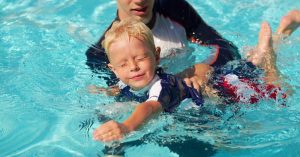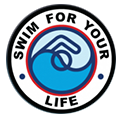Why Swimming Lessons Are So Important for Your Child with Autism
Courtesy of Elisabeth Nelson sourced from “The Autism Site”
Swim For Your Life is working with kids with autism and If you know anyone who has a child with challenges and would benefit from working with Ruth in the magical medium of water, call us in the office on 02 66801614.
Elizabeth’s article below is both informative and educational I hope you enjoy the read! See you in the Pool.
Regards Ruth
Swimming lessons are important to keep all kids safe from drowning, but it’s particularly vital for parents of children with autism to teach their little ones how to swim. Kids with autism are a whopping 160 times more likely to drown than neurotypical children, according to a study of more than 32 million death records.
Autism itself is not the cause of these extra drownings, but it does contribute some risk factors. Children with autism are often prone to wandering off, and some of them may seek out water because it’s calming or interesting to look at or touch. Autism-related conditions such as ADHD, epilepsy, and depression can also contribute to drownings.
According to Nandini Iyengar, M.D., director of Developmental Pediatrics for Crozer-Keystone Health System:
“Nearly half of all children with autism exhibit wandering behavior, and the likelihood of wandering increases with autism’s severity.”
Swimming lessons are a must for two reasons. First, they teach kids a healthy fear of the water and give them valuable resources for staying safe when confronted with a scary water-related situation. Secondly, they also teach kids that water can be fun if you know how to enjoy it safely.
“Swim lessons build their comfort with the sensory input they get from the water,” says Iyengar. “I’ve also seen swimming help them to build confidence in other areas of their lives.”
So you’re on board but don’t know where to start to teach your child how to swim? Well, you might seek out a swimming program in your area that’s specifically tailored to kids with special needs, or consider hiring a one-on-one swimming instructor for your child. The National Autism Association (USA) recommends some swimming programs for children with special needs.
If you’d like to try it yourself, however, here are some tips to get you off on the right flipper.
First, make sure you’re using precise and direct instructions rather than slang or any terminology your child may not have heard before. For example, he or she might not know what you mean by “paddle” if they’ve never been swimming before.

Photo: Flickr/Philms
You can also help your child out with a fear by conquering the task with them. If he or she is frightened of going underwater, offer to do it with them and tell them it’s okay to be scared. Having your child trust you and feel relaxed is one of the most important parts of making swimming lessons work, so take as much time and practice as your child needs.
Be consistent and have your child practice the same stroke numerous time. Introduce changes slowly and remember to celebrate all your child’s swimming triumphs, no matter how small. It may also help to allow your child to have free time that is separate from practice time to explore the water.







